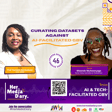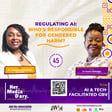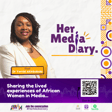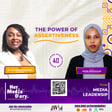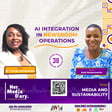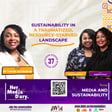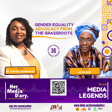Fighting for Rights: Women in Journalism
00:00:04
Speaker
I want to see female journalists open up, be ready to fight for their rights. Because sexual harassment can happen in a media house, the person is facing it, and the person doesn't want to open up and talk about it. I want to see men changing their behaviors towards female journalists. Female journalists are able, they are not tools to satisfy their desires.
00:00:31
Speaker
They have to understand that they are there for work. They have to respect them for work. I want them to change their mind in saying that, you know, a girl, she comes in the newsroom, she's dressing like a miniscuit and whatever. And that's why I want to rape her. That's why I touched her. That's why, no, no, no, no, no. These are things that they have to change and shift from that mindset. That is nonsense. And then by a mindset that is really a good one.
Introducing 'Her Media Diary'
00:01:04
Speaker
Imagine a world where we have gender equality and equity in and through media. That is our mission at African Women in Media. I'm Dr. Emsi Akimobola, your host, and this is Her Media Diary, a podcast that captures the lived experiences of African women working in media industries.
Meet Regina Akaliku Mutima
00:01:22
Speaker
In this episode, I'm joined by Regina Akaliku Mutima.
00:01:26
Speaker
a remarkable teacher, termed media owner and gender activist from Rwanda. Regina shares her personal experiences and involvement in the Kigali Declaration on the Admissions of Gender, Balancing them through Media in Africa by 2034, which has been a pivotal step in addressing gender violence in media across Africa. A journey into media was sparked by the challenges she As she observed as a teacher, many of her students struggled with issues stemming from the home environments where gender imbalance and conflict were prevalent.
Gender Imbalance in Education
00:01:58
Speaker
This motivated Regine to launch her radio program to Liri Ruwanda, meaning letters etiquette Ruwanda, which paved the way for her career in journalism.
00:02:08
Speaker
Throughout this series, we'll be in conversation with some of the signatories of the Kigali Declaration on the elimination of gender violence in and through media in Africa by 2034, which is an initiative co-designed with the African women in media community. And in these conversations, we'll find out how these individuals have implemented the tenets of the declaration in their work as media practitioners.
Kigali Declaration and Media Gender Violence
00:02:29
Speaker
By inviting these voices into conversation, we hope to provide solutions to breaking down barriers faced by African women in media.
00:02:42
Speaker
So Regine, you are the owner of a media company called, I'll try my best to pronounce it properly before I do the English translation. so it's angels Ubuto un Ubukuru. Did I do well? Yes. And that translates to angels of young. Yes. Ubuto means young age. Ubukuru means at that age. So in just Ubuto no Ubukuru, it's like an angel that guides a person in young age.
00:03:15
Speaker
and in her or his other age. This name helps me to contribute to the society, especially on health, because my tutorial line is in health, reproductive health and love and couples, because teenagers sometimes they are misconfused.
00:03:36
Speaker
love stories and they get confusion on love. Sometimes they don't understand that this person is just interested in them not because the person loves them, ah but because it's ah about attraction or it's about interest and so on. So we work.
00:03:56
Speaker
in different ages of people, teenagers, other people, in couples, in mental health, in reproductive health, in other sickness that can attack the body of a person. Yeah, so we work on the side of health. Yeah, that's Angel's auto-no-kur.
00:04:17
Speaker
And peace, yeah, I have forgotten this side of peace because here we're having conflict in the couples where men and women are a little bit not understanding each other on the side of gender balance and gender equity.
From Teacher to Media Advocate
00:04:33
Speaker
So sometimes it creates conflict between the the couples, the patriarchy side of men,
00:04:40
Speaker
of thinking that yes, they have not to lirese any power to the woman, any contribution of the ideas, they don't concern women, they think that women, sometimes some men think like that, not all men, but it's still a struggle that we still have ah to make people understand ah the reality of gender balance and equity. So how did you get into this What sparked your kind of interest in gender and media? I was just a teacher. Yes, I was just a teacher from 2006. And in school, most of the children, they had problems coming from families, conflict of couples, father, he's a drunkard, and sometimes he doesn't help in na supporting the the kid to go to school.
00:05:35
Speaker
to provide school materials because school is free in Rwanda. But ah there is a lot of contribution of the parent. Sometimes the when the father doesn't understand the reality of gender, you find the child is not a regular student or is not even um studying in a good way. So these are the the challenges I found in a school.
00:06:01
Speaker
And most of the time they were basing on the environment that the child is coming from at home. So this is something very, very crucial that made me first to go to a radio. It was a radio, not yet a television. It was called San Gustav and until now it is still there.
Becoming a Media Owner
00:06:23
Speaker
I created a program that was passing on Saturday only, ah one hour, ah where I can reach the teenagers and the young children from almost 6 to 18 years, 21,
00:06:40
Speaker
where I could just touch their mind and make them understand that ah this is not the end of life and they can ah fight until they study, they finish their school. So I was also talking to parents and I called ah the program, I called it to the Little Rwanda. It means let us educate for Rwanda. That's how I started my journalism career and that's how I ended myself to become a journalist.
00:07:10
Speaker
Then when I got there, I worked for two years as a volunteer. They liked my program, and then ah they proposed me to do another program that is called Inside the Secrets of Hearts, ah Niki Narwanda, Momabangayumu Chima.
00:07:30
Speaker
inside the of the hearts. Then um that time, I have performed two years again, just counseling couples, just talking about the topics of families, couples and so on. And that's how I ended by thinking that maybe people can get something written.
00:07:50
Speaker
more than also are in addition on na radio sessions. Then I created Angel's Uuto no Vokuru. I registered in Db and in RMC. And then I went to Rura, I got the license, then I started printing my newspapers that was called Angel's Uuto no Vokuru.
00:08:15
Speaker
It had three departments, angels for young, angels for adolescent, and angels for other young. It was from 6 to 14 years old, and angels for teenagers, it was from 15 to 18, 21, then other people from 21 up. So I printed like four times, then print disappeared because no one was buying It wasn't easy to sell. That's how I shifted from print and went online. But this time, what I do, I just print ah something ah for schools. I organize myself. I make a PDF document, PDF number, Avengers Rotonu Okuru.
00:09:03
Speaker
ah that contains testimonies, ah messages to teenagers in schools. Then when I go ah in schools, I distribute for free. I do it like twice a month, sometimes once a month, but it depends on my time because I print only at home with my printer. I print on A4 paper. It's not expensive. And most of the time I have like two pages in color. Other pages are black and white. I don't feel like it costs a lot of money, but it takes only my time to imagine it, to collect the testimonies and so on. It normally contains like eight pages.
00:09:51
Speaker
and it's only that. yeah And I have online ah that is angels
00:10:03
Speaker
and Okay, okay. All right, brilliant. So let's get to know you a bit better, Regine. Which part of Rwanda did
Roots and Upbringing in Kigali
00:10:11
Speaker
you grow up? Or was it like growing up for you? ah I was born in Southern province. I lived there like maybe one year and a half um because at one year and a half my family has taken me to my aunt in Kigali. My aunt used to have one child of the same age like me and she needed another child together and she couldn't make another baby. So that's how my mom and dad, they decided just to to give me to my aunt.
00:10:41
Speaker
Then I grew with ah my aunt, um my aunt in Iyamirambo, in Ikyigali city. I started a primary there in Ikyigali. I started NASA in Ikyigali, primary in Ikyigali. Then I yeah went to a secondary school in an excellent school called the Science Bimana. It's a religious school, but it's a school of the government, yes. Then after that, I went to university for um five years because i I made one year of languages and four years of bachelor's degree. What was it like growing up um with your auntie and not with your parents? It wasn't so bad, but my uncle, he was a drunkard, of course. Sorry to say it's my first time that I say it publicly, but he used it to drink a lot and to fight at home. It wasn't easy to sleep full night. Sometimes we we could sleep today and tomorrow. It's not easy. We knew that it can't last long, like two days. It wasn't easy, but ah my aunt was very good and she was a believer in God. She was just inspiring us positivity, but it wasn't easy.
00:11:55
Speaker
ah She was working in one of the ministries in Rwanda. It was a long time ago and she used to have money. It wasn't a problem of poverty. It was okay. It was a family that had everything. But the problem was the man. The man wasn't easy at all. And so what impact did that environment have on you, would you
Activism for Children's and Women's Rights
00:12:17
Speaker
um I think until now, I didn't realize before that my past has impacted me during my journey to my daily life. But after all, when I observed my life, sometimes I think that it impacted me a lot because it made me continue to observe a lot of children. They are growing like I have grown in a family where they don't have a peace of mind, where they can't sleep,
00:12:45
Speaker
Peacely thinking that tomorrow life will be happy. So that's why I contribute a lot in supporting the the children. But also I contribute in taking some children with me at school as a teacher. I was just, I have created a club. I called it Hope Club.
00:13:04
Speaker
Children Hope Club, it was a club where I could just so put together the the children the student and they can express themselves, their feelings, their invisible wounds can come out and I can just support them because I followed some courses on healing opportunities, especially trauma, stress and violence in children. And I tried myself every time to support those kids because we have many, many at school where they are coming from, irresponsible parents, irresponsible parents. And I could just support in talking, in providing some school materials, when I could find, sometimes I could talk to the parents, other times I could provide even food, because when a parent is not stable, even to feed the kids become a problem.
00:13:52
Speaker
it wasn't easy and it influenced my actions there, but also my past influenced me until now to continue to fight for the cause of women. Our country Rwanda is a very very good country with ah his excellent Spokagame who has political will to support women, to promote women and to keep supporting them to go to school to to fight for work and get jobs and a lot but um he's not working in all sectors because ah he is the president but he's not um
00:14:30
Speaker
A man at home in our families, he can't be everywhere. He can't be everywhere. That's the term, the real one. He can't be
Programs for Gender Equity
00:14:39
Speaker
everywhere. And some men, they still have this, sir they are broken to understand.
00:14:46
Speaker
the gender balance gender equity and they are not they don't want even to understand it and this is something that is crucial that's why we still have to sensitize to work to make people understand that's why i think that my past with that man at home who was a fighter who was not a good person made me to create this program. it It is working on couples in peace and family, and to create Angel's Utonbukuro, which is a newspaper that where I can put my ideas to influence people to take good decisions.
00:15:28
Speaker
especially with their kids and especially with their relations as other people so it influenced me and now that I'm an activist most of the time people they tell me Regina you are a feminist because Some cases they come, you find a case of a conflict between a man and a woman that ended in a bad way. And when we discuss with the other journalists, ah they you just, men, they want to to take side of the man. And you find that they are just doing it voluntarily. They don't want to understand the problem and the cause of the problem. Then I try to make them understand.
00:16:11
Speaker
the cause of the problem and they say no Regina is because you are a feminist you just fight for a women but you don't understand men which is not true it's just that patriarchy of some journalists some men
00:16:27
Speaker
Hello, media diary listeners.
Understanding the Kigali Declaration
00:16:30
Speaker
Our permit me to introduce you to the Kigali Declaration on the Elimination of Gender Violence in and through Media in Africa by 2034. And we here at I would call it the Kigali Declaration. It's a groundbreaking commitment by African women in media to bring gender equality representation and respect into every news from across the continent by signing up.
00:16:51
Speaker
Media organisations, professionals, platforms, regulators and academics are pledging to tackle gender barriers, amplify women's voices and create safer, more inclusive work environments for everyone.
00:17:05
Speaker
Imagine a media landscape that treats every story with balance and every voice with dignity. Adopting the Kigali Declaration isn't just a commitment, it's a powerful step forward towards social change and it starts with you and I. If you're ready to be part of this change, visit the official Kigali Declaration website at africomaniamedia.com slash declaration to learn more and to sign up.
00:17:34
Speaker
Yeah, that that's interesting. There's always this kind of zero-sum kind of perspective that people take sometimes when we're talking about gender equality that almost has to visit us against them kind of situation. But that's not what gender equality and the advocacy for it is is about. and you know um You're based in Kigali, and yeah last year you were at the conference, the Albums 23 conference, where we adopted the Kigali Declaration on the Communication of Gender Violence and Natural Media in Africa by 2034. And you know, it it was an instrumental, significant moment because it's the first time such a thing had been done and you are one of the
00:18:14
Speaker
signatories to that and Kigali Declaration and I think very poignantly that you're based in Kigali as well. So can you tell me what does the declaration mean for you and the work that you do around gender equality in media? Yeah, um that declaration first has made me come back on the problem because I have shared a lot of ideas with some women from different countries in Africa where they still have a situation where It is still difficult more than our country, but also other countries that are a little bit okay good. yeah ah So I found that it is a fight that is not a fight for me only.
Fighting for Gender Equity in Media
00:18:56
Speaker
All women should fight for that. And for this time,
00:19:01
Speaker
um I'm an open-minded in talking about gender equity and gender balance. I'm an open-minded in talking about sexual harassment because before the declaration I was talking about it but when people they were starting fighting me I was thinking maybe I'm wrong, maybe I'm the one who is having a problem.
00:19:22
Speaker
Maybe this is not the reality, but when I found that different people are keeping talking about it, ah findings are there, ah discussions have been there, and I was listening to women where they they were just reading on situations they have faced, especially in media and in different places, I found that really it is not a fight that I'm alone. I have to fight openly and help women um to emancipate themselves and talk about what is happening.
00:19:56
Speaker
ah just to fight it and to make men understand that really women are not their enemies and gender balance is not an enemy of men, it is only a reality that they have to understand, that they have to welcome in their family for a bitter ah yeah the better of their families. So what aspect of the declaration resonates most with you, especially in the context of Rwanda?
00:20:26
Speaker
And, you know, again, as we said, the declaration is about the kind of gendered experiences, particularly violence and gender-based violence experiences that women journalists experience, but then also in terms of how media represents gender-based violence stories. Right. So what aspect of the declaration really resonates most with you in the context of Rwanda?
00:20:48
Speaker
ah In the decoration, a lot of aspects have been there. I have seen nurse a woman who owns a television and a country in Africa. Is it Zimbabwe or ah it's a country in Malawi or something? And then I have liked this way of finding that the numbers we are having for sexual harassment in Rwanda, it's ah almost everywhere in Africa where they are still having this problem of sexual harassment, especially in the media industry. Men in the media, there are still a lot of number more than women. And ah they don't want to understand that women are also able to perform well at work and to perform well, especially on the field when they went for an interview for Voxpop and everything. But in doing also hard news,
00:21:44
Speaker
Here, some men they don't trust in women. You may go in a media house and the owner or the chief editor is a man. And the man doesn't understand that you as a regime, a woman, can just go to the field and do an economical story, a story on the budget line, analyze the budget, and see the gaps in the laws. So those things, they think that we are not brained enough to do that.
00:22:14
Speaker
So for men who attended the decoration, they have changed their mindset. I loved the way before when the research was being done, before the decoration, I loved the way Arthur, he told us in a meeting of the presentation on at sexual harassment policy before we we did it, and it was in the presentation on the findings that a whim or you you have done for with you. Then he said, I didn't know that sexual harassment is present yeah in our media houses. He said it. It means that if Ata couldn't understand that this something can happen in the media house where he is, or in another media house, it means that a man with a bad character
00:23:07
Speaker
But who is a leader in a media house? We don't understand ten times. Absolutely. That's why I loved the declaration. It has invited a lot of men. It attracted a lot of men. We were not women only. We were men and women. So they had the time to enjoy the truth, to understand the truth.
00:23:33
Speaker
and to be ready for changes. Women alone cannot fight to this fight. No, not alone. They need men to fight together for changing the minds of people. Yeah and I mean I'm pleased that you mentioned kind of the kind of initial activity that and we did before we got to the declaration because as you know we had done researched, I looked at the lived experience of women journalists across Africa, but and also in this case, specifically in Rwanda as well, and presented it to different stakeholders. And like you said, it was really important to have
00:24:07
Speaker
those champions in the room like Arthur Azimway, who was then the Director General of RBA, who was able to champion and say, you know, this is an issue that I want to do something about, right? So it's it's really important, like you said, that it's not just seen as a women-only agenda, but it's a collective societal issue that needs to be addressed jointly. so Being somebody that was in the process right from the beginning and also signature to the declaration, what are some of the things that you've done? And especially as a media owner yourself, what are some of the things you've done to implement the declaration? Yeah, um everything must be implemented. but
00:24:45
Speaker
My media house is ah still small. I need to have more time for it, more investment to put in it, ah because we need to have enough hand on the policies, like anti-sexual harassment. I have signed the anti-sexual harassment policy with the Foyo that Foyo has released. But to implement it is another thing.
00:25:13
Speaker
because yeah I need first to train my journalists, the people I work with. I need to train volunteers I work with. I need also to have contracts that are printed with anti-sexual harassment. So these are things that I still need to work on, but not yet with enough means I just influence other media houses to implement it.
00:25:40
Speaker
and to buy the decorations, the commendations, and to understand why these recommendations have been ah there. We have signed them. So these are ah the things that I can contribute by now, but are not enough. I still have a lot to do and a long journey to go.
00:25:59
Speaker
Absolutely. Like you said, it's one thing to have these kind of documents like the Gullah Declaration and even gender policies in newsrooms, right? where The challenge there is implementation. And then even when you implement, there's a process that needs to be done in terms of monitoring, evaluation, and keeping that momentum and interest beyond when these things become you know pass on, because we have those moments aren't where the world is focused on an issue and then things move on. And really, it's really down to the advocacy and support of people like yourself, that they keep up
Future Hopes for Rwandan Media
00:26:31
Speaker
momentum. So when you look ahead, then, what changes you hope to see in Rwandan media? And just to give some context to that question, so now, to Rwanda, after we've done that research, um you have the anti-sectional harassment committee, you have the anti-sectional harassment policy, you have the Kigali Declaration, right? So when you
00:26:52
Speaker
Look to the future of media in Rwanda. What do you hope to see when it comes to things around addressing the kind of violence women journalists experience and then also how the media represents gender-based violence? Yeah, first of all, we are just on the way of ah resettling the gender desk by the support of Foyo in ah a synergy that is putting together a community media platform that I'm the legal representative. our feme that is an association of female journalists also in Rwanda. And we mock human media owners for change, an association of female owners of media houses. So we are just having a synergy and the synergy has started to work.
00:27:37
Speaker
And we are working on, first of all, the gender desk that is operating for two years and see what's going on. The gender desk will help this woman, because I want to see female journalists open up, be ready to fight for their rights. Because sexual harassment can happen in a media house, the person is facing it, and the person doesn't want to open up and talk about it. Sometimes she doesn't even understand that it harms ah herself.
00:28:05
Speaker
She thinks it's love and by the end she's deceived. Other times she's raped. I know a a girl that a man has found in a studio of radio. Then he started to take her like this, like he wants to kill her because she refused to sleep with him. They were both journalists and the girl didn't go to hospital, didn't go to see a doctor or to be checked.
00:28:30
Speaker
on and by the end she found that she doesn't hear. Then this case we are just following it in those and also we are taking her to hospital. Then I want to see these girls and women in media in my country to be people who understand their rights so that they can fight for their rights.
00:28:54
Speaker
I want to see men changing their behaviors towards female journalists. Female journalists are able. First, they are able. Second, they are not tools to satisfy their desires.
00:29:09
Speaker
They have to understand that they are there for work. They have to respect them for work. I want them to change their mind in saying that, you know, a girl, she comes in the newsroom, she's dressing like a miniskit and whatever. And that's why I want to rape her. That's why I touched her. That's why, no, no, no, no, no.
00:29:28
Speaker
These are things that they have to change and shift from that mindset that is not nonsense and then buy a mindset that is really a good one. So there is a lot of things to do. I want to see media houses, all media houses in Rwanda to sign their media policy and also to the media policy and the and sexual harassment policy and to have them in their media houses with their journalists understanding it and implementing it. yeah There are a lot of things to to do that I want to see. so
00:30:01
Speaker
We are um having this gender desk that we are following up. We are having this on sexual harassment policy that we are working on it also, so that we make a follow-up and go in different media houses to see if really they are implement implementing it.
00:30:17
Speaker
Yeah, and we want also to mentor young girls, future female journalists, first of all, to differentiate work and their friendship, love stories and different things, professionalism.
00:30:33
Speaker
requires these girls and women to understand that they have to separate their intimate life and their professional life so that in the future they don't come out and say you know this journalist has told me that he loves me and she got pregnant and the man was saying no no no this is not ah my my problem So we still have those cases here of girls who don't understand really that they have to to be serious at to work and separate both sides. Brilliant. Thank you so much, Regina, for your time and meeting with me and talking to me about your journey, establishing your organization and your commitment to the Kigali Declaration. It's been a pleasure having you on the podcast. Thank you so much, Dr. Emisi.
00:31:29
Speaker
Regine's story is not just about personal wealth, but about societal impact, and it all began with a deep-seated desire to address the conflicts she witnessed in her
Perseverance for Safe Media Environments
00:31:40
Speaker
students' lives. As a media owner, Regine is aware of the challenges in implementing policies like anti-sexual harassment measures. However, she remains steadfast in her vision for future media houses in Rwanda, ensuring a safe and equitable environment for all journalists.
00:31:54
Speaker
Her story is a testament to the power of resilience and advocacy, reminding us that change is possible and we dare to challenge this status quo.
Contact Information
00:32:03
Speaker
Talk me an email at emc at AfricanWomenInMedia.com with your thoughts and let me know if you'd like to join me on an episode of this podcast. To find out more about African Women in Media and our work, visit our main website at AfricanWomenInMedia.com. In the show notes, there's a list of organizations and resources to support you if you've experienced any of the topics discussed today.
00:32:22
Speaker
and don't forget to subscribe to her media diary on your favorite podcast and platforms if you are in Sierra Leone then you can tune in to our partner radio station rise radio 96.3 FM every Saturday at 4pm to catch an episode of her media diary and don't forget join the conversation using the hashtag her media diary
00:32:47
Speaker
Hemi Dear Diary is a product of African women in media, an NGO advocating for gender equality in the media industry. And this episode was hosted by Dr. Yemisi Akimbobola, produced and edited by Blaise and Ojibwase as part of a four-episode series on the Kigali Declaration. All music featured in this podcast is by Nana Kwabena. Thanks for listening and join us again next time.






